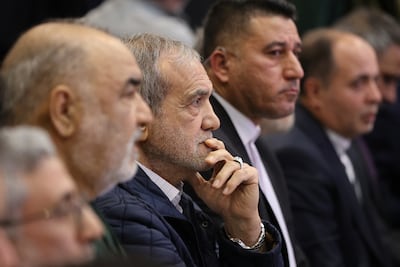Iran is often in the news for its regional and international affairs, but in recent weeks a domestic political issue has dominated the headlines in the country – censorship of the internet.
Ordinary Iranians have had limited access to the internet for very many years now. Thousands of websites are banned, as are popular platforms such as Facebook, Instagram, X and Telegram. While this amounts to the suppression of a basic freedom, the blanket censorship also poses economic problems, given that hundreds of thousands of Iranians rely on social media for doing business.
Relaxing restrictions on both internet use and the mandatory head-covering for women were among President Masoud Pezeshkian’s campaign promises when he ran for office last year. But since most of the political power in Iran resides outside the President’s office, he has found it difficult to fulfil these promises.
Last month, a preliminary but important step was taken towards removing some curbs on internet freedom when Iran’s Supreme Council of Cyberspace agreed to allow unrestricted access to WhatsApp and Google Play. This came as disappointing news for many, as bans remained in place for much more popular apps such as Instagram and Telegram. The running joke has since been that nobody remembers what Google Play is used for.
The modest scope of the measures can be explained by the SCC’s composition (which in and of itself is a reminder of Dr Pezeshkian’s limited powers). Of the Council’s 28 members, 10 are appointed directly by the country’s supreme leader, Ayatollah Ali Khamenei, while others serve ex-officio and include Dr Pezeshkian himself as well as heads of the other branches of government, six cabinet ministers, head of the national broadcaster, head of the Islamic Revolutionary Guard Corps, and the chief of police.
Other than Dr Pezeshkian, there are other powerful internet freedom proponents in the Council, such as Speaker of the Parliament Mohammad Bagher Ghalibaf and Gholamhossein Mohseni Ejei, who heads the judiciary. But most Khamenei appointees as well as many ex-officio members, including Dr Pezeshkian’s own Defence Minister, Aziz Nasirzadeh, oppose the President’s internet freedom agenda.

As a result, its decisions have had to be made by compromise. But proponents of internet freedom fear that Dr Pezeshkian’s concessions have resulted in not only a pared-down agenda but a potentially worsening of internet use. The exact details of the SCC’s ratification last month have not been published. But a version leaked by the Mehr News Agency, an outlet close to the top leadership, shows that the Council is moving towards the adoption of some ideas that have long been warned against by internet freedom advocates.
One of these ideas is “tiering the internet”, which means that free internet would be made available only to members of select professions such as journalism and academia. The other is the promotion of “governance-compliant platforms”, which is an opaque way of referring to apps created by the government that will let users access banned sites such as YouTube or Telegram; but only while being closely surveilled by the authorities.
Many in Iran are opposed to such methods.
Hamidreza Ahmadi, a senior member of the Tehran E-Commerce Association, is among them. His contention is that if such a government-sponsored proxy app is created for YouTube, users’ visits wouldn’t be counted on the website, subscriptions wouldn’t be possible, and content would thus not be seen widely. This is why Mr Ahmadi believes it would be better to leave YouTube under the current ban than to create such a proxy app.
Internet freedom advocates have long agitated against such plans.
“Pezeshkian has made a deal with his hardliner opponents,” Amir Rashidi, a director at Miaan Group, a US-based group advocating for digital rights in Iran, told The National. “He would bring about a minimum-level satisfaction [by lifting the ban on some platforms] while allowing for concepts such as the tiered internet. The future of the internet will be very dark.”
Hardliners, however, continue to speak out against Dr Pezeshkian’s plans. Late last month, internet freedom opponents in Tehran organised a demonstration on motorcycles after the Friday prayers. Passing through the capital on their two-wheelers, they said any move to relax restrictions would be a boon to Iran’s enemies.
Mohammad-Hassan Ghadiri-Abyaneh, a former ambassador to Mexico and Australia, opposed lifting bans on even WhatsApp and Google Play, saying: “They want to make Iran into Thailand.”
Such colourful language has also been used by members of the Centre for Promotion of Good and Prevention of Vice, a body charged with spreading Islamic ideals in society. One official said lifting restrictions would be “a dagger to the back of revolution” and would serve to help detractors such as Israeli Prime Minister Benjamin Netanyahu.
Despite such rhetoric, the tide appears to be turning in favour of lifting restrictions.
For its part, the Pezeshkian administration has pledged to continue its march towards internet freedom. On New Year’s Day, Communications Minister Sattar Hashemi said the government is working hard to eventually lift the ban on all platforms.
The Javan newspaper, an outlet closely aligned to the IRGC, conceded that the current internet bans are “irrational and undesirable”. Mansur Haqiqatpur, a veteran IRGC commander and former MP, supported Dr Pezeshkian’s plans and called the recent motorcycle demonstrations in Tehran futile.
The sign that the tide may indeed be turning is clearest inside Parliament. A group of 136 MPs recently co-wrote a letter criticising the SCC’s recent decision and called it “a wonderous gift to our enemies in the soft war”. Tellingly, however, the group has chosen not to release the names of the signatories. Evidently, the MPs themselves know that theirs is a hugely unpopular position.

